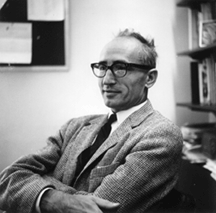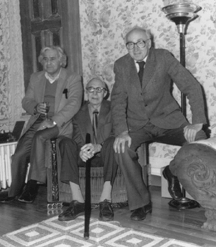
 |
Appreciation of Louis Dudek The People's Intellectual by Bruce Whiteman
He wrote many book reviews and essays, delighted in the thrust of the epigram (of which he published two collections), and was clearly seldom happier than when seated at Ben's delicatessen or a Chinese restaurant arguing with fellow poets, McGill colleagues or friends. He was passionate about ideas and about literature, and endlessly curious. He was also, I think, like all poets, lonely at heart. My most vivid memory of him is from the mid-1980s, when he invited me to his Westmount home to listen to Bach's "Art of the Fugue" in a recording for piano. It was late in the afternoon as we got toward the end of the piece, the sun was disappearing, and I can see him –tall and singular— sitting on the edge of a daybed, concentrating on the music and staring fixedly into space. I thought then that I had never seen a look that bespoke loneliness more unmistakably. Dudek preferred to publish his work with the smaller presses, and he kept up a lifelong battle against some of the most famous and influential voices in Canadian cultural writing, including Northrop Frye and Marshall McLuhan. Perhaps for these reasons, some of the major awards eluded him. THREE GENERATIONS But his work was a beacon to three generations of Canadian poets, and among them are names like Daryl Hine and Doug Jones in the '50s, George Bowering and Frank Davey in the '60s, and Ken Norris, Endre Farkas and Peter Van Toorn in the '70s and '80s. Dudek was passionately supported by small-press publishers, and Simon Dardick of Véhicule Press and Sonia Skarstedt of Empyreal are two Montreal publishers who continued to issue his books until the end of his life. Dudek was born in 1918 in Montreal and spent most of his life here, including a teaching career at McGill that spanned 30 years, from 1951 to 1982. He was an international modernist by conviction, and his graduate education took place in New York; but all the same, his life and his life's work were intimately tied to Montreal, a city he sometimes execrated for its provincialism, but which on the whole he celebrated and loved. Dudek attended McGill, and his first published poems appeared in the McGill Daily in 1941. In the early '40s he worked in Montreal in the advertising business, but he returned to university in 1943 and eventually received a PhD from Columbia University. In the 1940s, he was closely involved with the important literary magazine First Statement, which was edited by John Sutherland (another McGill student), as well as with the later Northern Review, which Sutherland also edited. He made contact with poets like Irving Layton and Raymond Souster in Canada, and in New York came to know some of the younger writers who looked to Ezra Pound and William Carlos Williams as mentors, including the editor and poet Cid Corman. Dudek himself became a passionate admirer and defender of Pound, and his efforts contributed to the older poet's release in 1958 from St. Elizabeth's mental hospital (where Pound had been confined since 1946).
He was an indefatigable fomenter of presses and little magazines. He founded the McGill Poetry Series in 1956 and through it published Leonard Cohen's first collection when Cohen was still an undergraduate. He founded his own magazine, Delta, in 1957, and was later involved with several other poetry presses, the last of which was DC Books, which he and his wife Aileen Collins, ran until 1986. REALIST LYRIC POET Dudek began as a realist lyric poet, and his first collection, East of the City (1946), contains some remarkable evocations of Montreal and of the life of the poet. "The flame of a man's imagination should be organic with his body,/coincident with an act, like an igniting spark," he wrote in "On Poetry"; and in the midst of the city, hanging out over a bridge and knocking mud off his boots while the traffic whizzed by, he claimed with justice: I am walking full of poems; I make Under Pound's influence, Dudek went on in the following decades to write a series of remarkable long poems—Europe, En Mexico, Atlantis, and Continuation—in which he demonstrated his immense poetic resources and his belief that poetry at heart was a form of spiritual exercise. His work bespeaks a tremendous conviction that poetry still matters, that it is or ought to be a civilizing influence, and that it can be as wise as philosophy, as allusive as the finest meditative prose, and as full of desire as the body in the world itself is. He was often discouraged by poetry's invisibility in contemporary Canadian society (".001 per cent read poetry,/ 200 out of 20 million"); but for all the times later in life when he confidently claimed to have written his last book, he never gave up writing poetry, nor abandoned belif in its efficacy. At the outset of Continuation, he wrote: "Beyond a few sentences, in our lives, there is nothing." Dudek also wrote a fine elegy for the American poet William Carlos Williams. Isn't it (death) stupid? That all a man |
||||
|
| Downtown Montreal Guide | Old Montreal Guide | Guide to Eating Out | Walking Tours | | Urban Landscape | Guide to Literary Montreal | Montreal Vintage Photos | | Montreal Links | Montreal Jazz | www.vehiculepress.com © Véhicule Press, All Rights Reserved |

